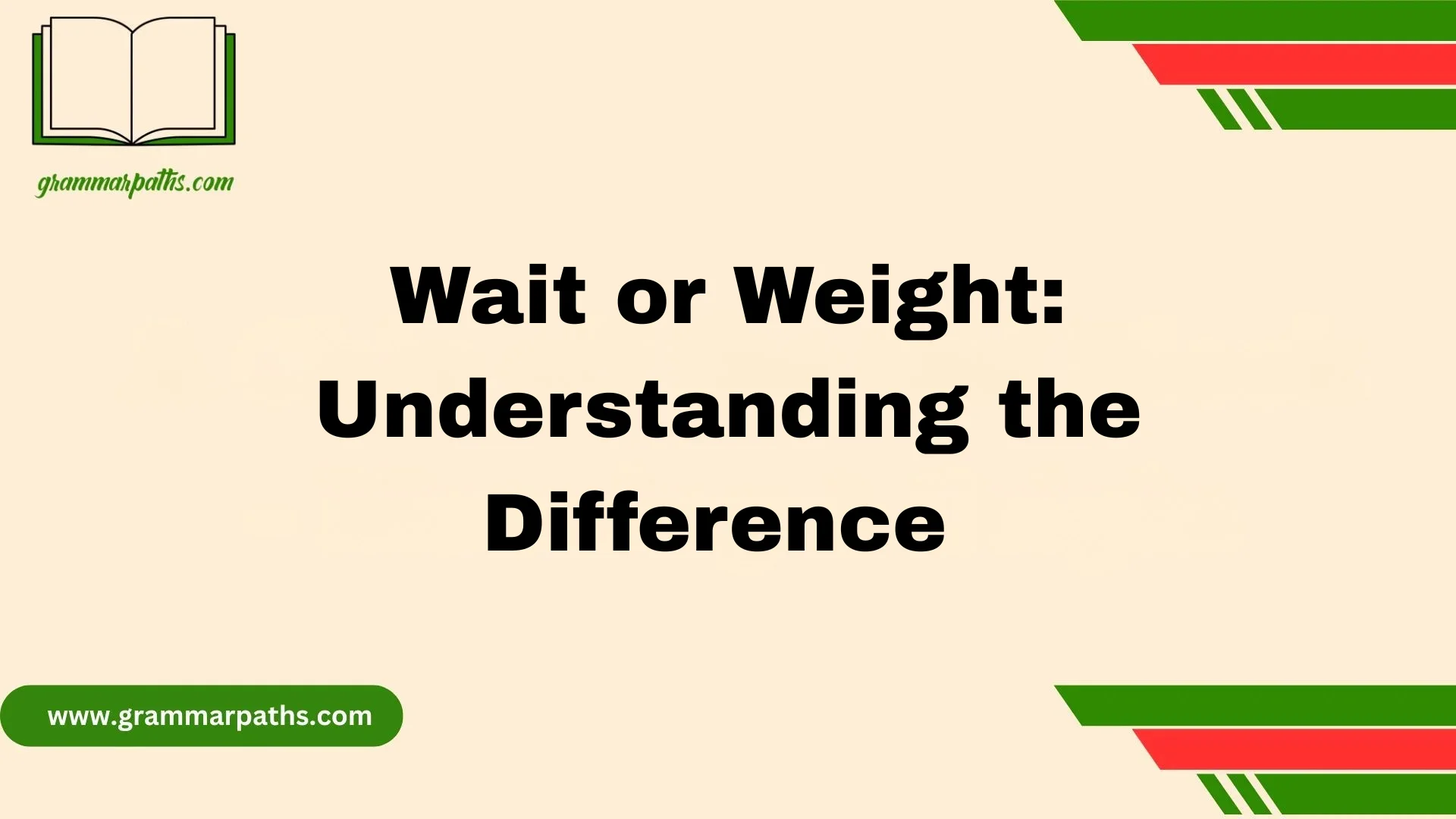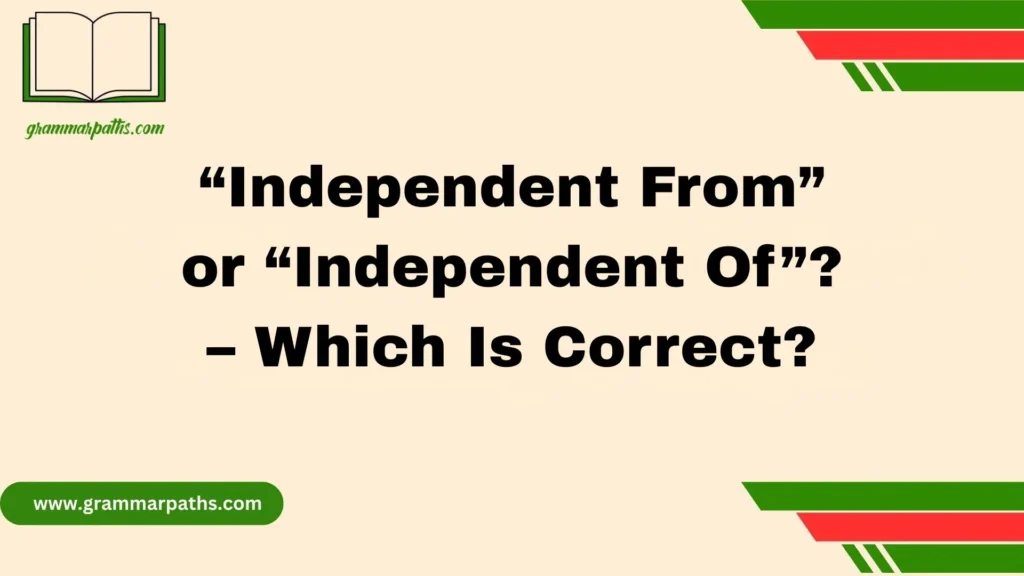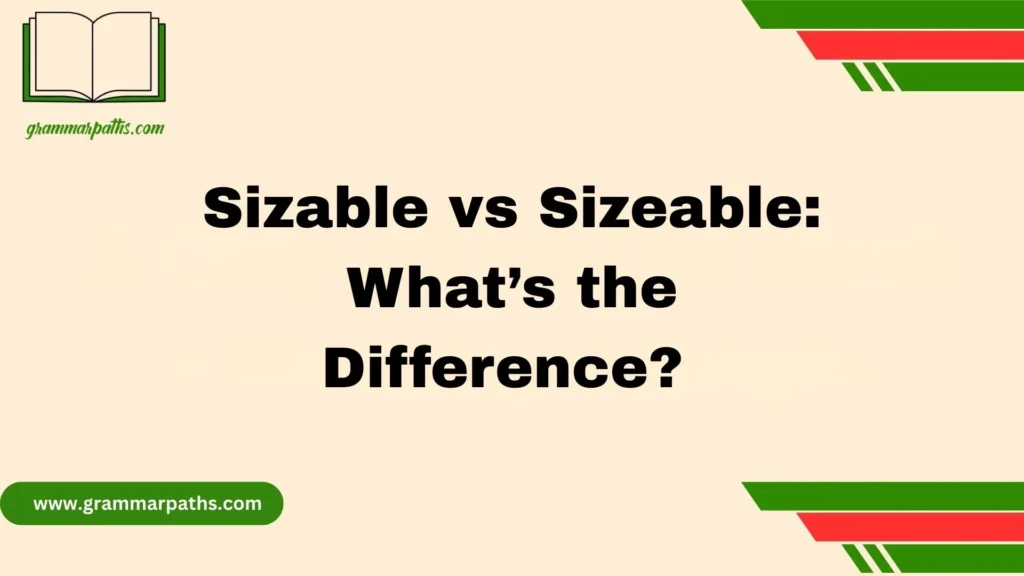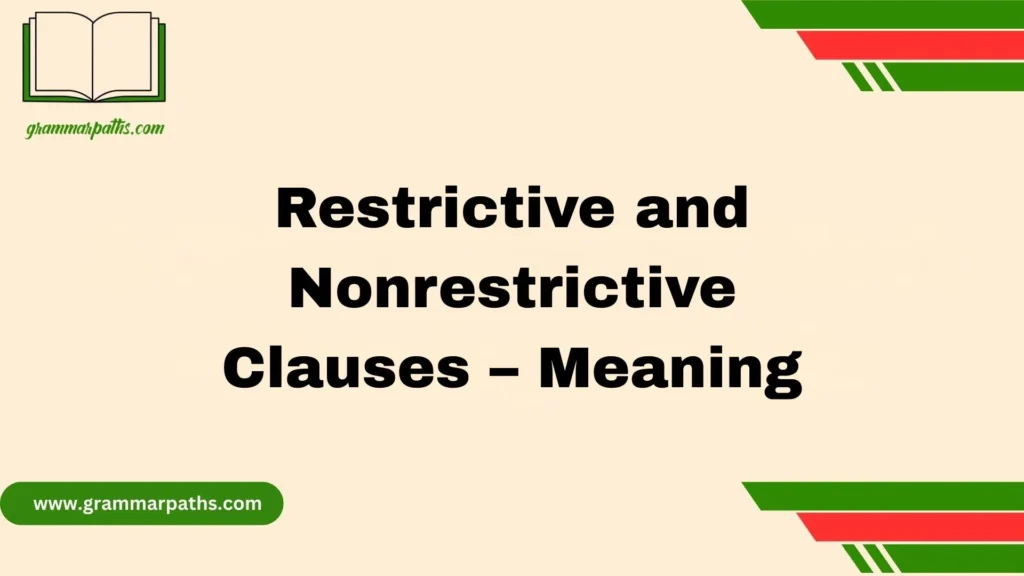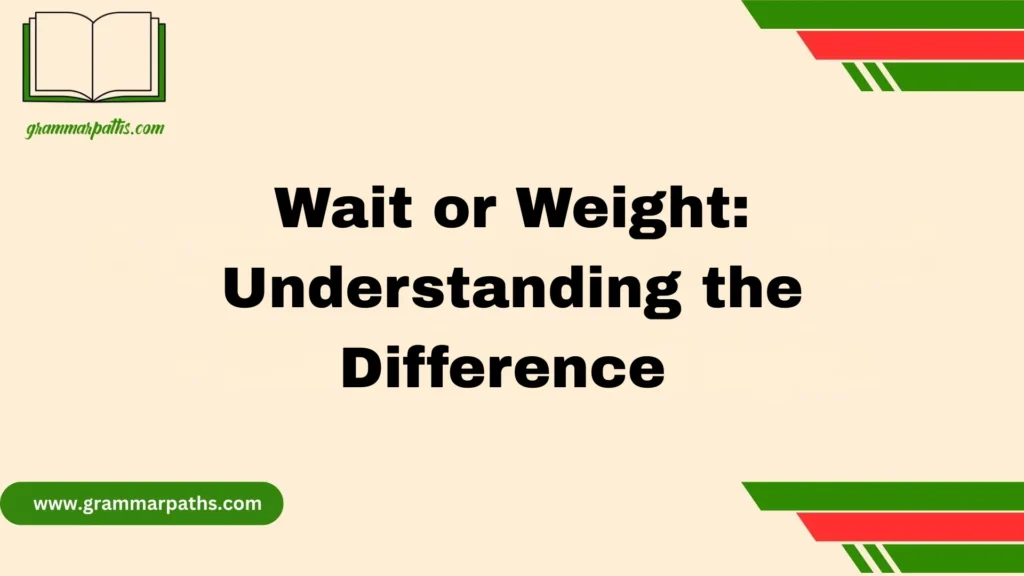In the English language, I’ve seen many learners and even fluent speakers fall into tiny traps and quirks that often confuse them. One of the biggest pitfalls comes from recognizing homophones—words that sound the same but mean something completely different. At first glance, Wait vs Weight might seem indistinguishable when spoken aloud, and that detail alone can create a lot of confusion in writing. When I tutored an ESL student, he often used weight instead wait in his essay, and it looked quite awkward, sometimes even funny or costly. He once wrote, “I Can’t weight to meet you,” in a job application—a small mistake that almost cost him the position.
To help others avoid similar mix-ups, I created a short guide to clarify the difference with real-life examples, precise definitions, and practical usage tips. Over the years, I’ve worked with many students, using various tools and methods applied with ease to eliminate these errors once and for all. The context is often the biggest clue—each sentence gives hints about functions and intended meaning. It’s a tricky lesson, but with awareness, you can master it.
The Core Confusion: ‘Wait’ vs. ‘Weight’ at a Glance
Let’s face it: the reason most people mix these words up comes down to sound. When spoken, they’re pronounced exactly the same way — /weɪt/. But when written, they couldn’t be more different.
Here’s a quick side-by-side comparison to make it crystal clear:
| Feature | Wait | Weight |
| Part of Speech | Verb / Noun | Noun / Verb |
| Meaning | To stay in place or delay an action | The heaviness or mass of something |
| Example | “I’ll wait for you outside.” | “The weight of the package is five pounds.” |
| Pronunciation | /weɪt/ | /weɪt/ |
| Main Concept | Time, patience, delay | Mass, gravity, measurement |
Think of it this way:
Wait = time.
Weight = heaviness.
What ‘Wait’ Really Means (Definition + Usage)
The word “wait” comes from the Old North French waiter or guaiter, meaning to watch or to guard. Over centuries, it evolved into the meaning we use today — to stay somewhere or delay doing something until a certain time or event happens.
As a Verb
When used as a verb, “wait” expresses the action of delaying movement or action.
- Example: “Please wait until I finish speaking.”
- Example: “We’ll have to wait for the results.”
As a Noun
When used as a noun, “wait” describes the period of time spent waiting.
- Example: “There was a long wait at the restaurant.”
- Example: “After an hour’s wait, the bus finally arrived.”
Fun fact: In British English, “wait” was also used historically for “a watchman” — someone who waited or kept guard during the night.
How to Use ‘Wait’ Naturally in Sentences
You’ll hear and use “wait” every day — in conversations, instructions, or even when you’re impatiently standing in line. But using it correctly in sentences requires attention to context and tone.
Common Expressions and Idioms with “Wait”
Here are some examples that make everyday English more colorful:
- “Wait up!” – A friendly way to tell someone to slow down.
- “Can’t wait!” – Shows excitement or anticipation.
- “Good things come to those who wait.” – A proverb that teaches patience.
- “Wait and see.” – Means to be patient before making a judgment.
Examples in Different Tenses
| Tense | Example Sentence |
| Present | “I wait for the bus every morning.” |
| Past | “We waited for hours in the lobby.” |
| Future | “You’ll have to wait until tomorrow.” |
| Continuous | “I’m waiting for my turn.” |
| Perfect | “She has waited long enough.” |
Tip: “Wait” often pairs with “for” (as in “wait for something”). Forgetting “for” is one of the most common grammar mistakes learners make.
What ‘Weight’ Means and When to Use It
Now, let’s talk about “weight.”
The word “weight” refers to how heavy something is. It comes from the Old English wiht, meaning “something of a certain mass or heaviness.” Over time, it evolved to include literal and figurative meanings — from the pounds you see on a scale to the “weight” of responsibility you might feel.
As a Noun
- Literal Meaning: “The weight of the suitcase exceeded the airline limit.”
- Figurative Meaning: “His opinion carries a lot of weight in this company.”
As a Verb
“Weight” can also act as a verb, meaning to add importance or give emphasis to something.
- Example: “The survey results were weighted to reflect regional population differences.”
Examples of ‘Weight’ in Everyday Contexts
The word “weight” pops up in countless scenarios — from science to fitness to everyday speech.
In Science
- “Weight” is the force of gravity acting on an object’s mass.
- It’s measured in newtons (N) in physics, though pounds or kilograms are used in everyday life.
In Fitness
- “She’s trying to lose weight before the wedding.”
- “He lifted a weight of 150 pounds at the gym.”
In Figurative Speech
- “There’s a lot of weight on her shoulders after that decision.”
- “Their endorsement adds weight to the campaign.”
Common Collocations with “Weight”
| Phrase | Meaning |
| Lose weight | Reduce body mass |
| Gain weight | Increase body mass |
| Underweight / Overweight | Below or above healthy body weight |
| Throw one’s weight behind | Support something strongly |
| Pull one’s weight | Contribute fairly to a group effort |
Why ‘Wait’ and ‘Weight’ Sound the Same: The Homophone Factor
Both words are pronounced /weɪt/ — same sound, totally different meanings. That’s what makes them homophones.
What Are Homophones?
Homophones are words that sound identical when spoken but differ in spelling and meaning.
Examples include:
- “Right” and “Write”
- “Two,” “Too,” and “To”
- “Flower” and “Flour”
Why Does English Have Homophones?
Because English is a blend of languages — Latin, French, Germanic, and more. Over centuries, words evolved differently in writing but merged in pronunciation.
Quick Diagram:
Sound (same) → “Wait” / “Weight”
Meaning (different) → “Delay” vs. “Mass”
Spelling (different) → “ait” vs. “eight”
The Linguistic Science Behind Homophones
Homophones are a byproduct of language evolution. When words from Old English, Old Norse, and French collided, many kept their sounds but not their spelling.
- “Wait” traces back to Old North French “waitier” — to watch or stay alert.
- “Weight” comes from Old English “wiht”, related to “heavy” or “thing of substance.”
So while they sound alike today, they’re linguistically unrelated.
This phenomenon shows why English spelling doesn’t always reflect pronunciation — it’s a mix of many language influences layered over centuries.
Common Mistakes Learners Make With ‘Wait’ and ‘Weight’
Even advanced learners mix these two up. Here’s a breakdown of typical errors and how to fix them.
| Mistake | Why It’s Wrong | Correct Form |
| “Please weight for me.” | “Weight” refers to heaviness, not time. | “Please wait for me.” |
| “I can’t wait the package.” | “Wait” doesn’t take direct objects. | “I can’t weigh the package.” |
| “She has a lot of wait to lose.” | Wrong word for body mass. | “She has a lot of weight to lose.” |
Pro Tip: If you’re talking about time, it’s wait.
If you’re talking about mass or pressure, it’s weight.
Sentence Challenges: Test Your Understanding
Fill in the blanks with either wait or weight:
- I can’t _______ to see you again!
- The _______ of that box surprised me.
- Please _______ here until I call your name.
- After the surgery, she began to lose _______.
- You’ll just have to _______ and see what happens.
Answers:
- wait
- weight
- wait
- weight
- wait
Etymology: Tracing the Origins of ‘Wait’ and ‘Weight’
| Word | Origin | Historical Meaning |
| Wait | Old North French waiter / guaitier | To watch, guard, or be alert |
| Weight | Old English wiht | Thing of mass, heaviness |
Interestingly, “wait” originally referred to watchmen or night guards in medieval towns. Over time, it came to mean to stay or delay action.
“Weight,” on the other hand, was connected to objects of substance or heaviness, later evolving into its modern scientific sense.
Memory Hacks to Remember the Difference
Here are some mnemonics and tricks to help you instantly tell them apart:
- Think of numbers: Weight has eight in it — just like pounds and kilograms relate to measurement.
- Think of patience: Wait starts with “W-A-I,” as in “waiting in a line.”
- Visual trick: Picture the letter G in “weight” as a gym dumbbell — it reminds you of heaviness!
Quick Tip: Reading aloud helps your brain connect the sound to context. When you see “wait” or “weight” in text, imagine the situation — time or mass.
When to Double-Check Your Writing
Even seasoned writers slip up with homophones. Here’s how to avoid errors:
Use Spell Check — But Don’t Rely on It Alone
Most spell-checkers won’t flag “weight” if you meant “wait.” They check spelling, not context. Always proofread manually.
Try Grammar Tools
Programs like Grammarly or Hemingway Editor can help catch context-based mistakes.
Do the Read-Aloud Test
If you’re unsure which word fits, read the sentence aloud. If it sounds off or silly, you’ve likely chosen the wrong one.
Quick Recap Table: ‘Wait’ vs. ‘Weight’
| Feature | Wait | Weight |
| Part of Speech | Verb/Noun | Noun/Verb |
| Main Meaning | Delay or stay | Heaviness or mass |
| Example | “Wait for your turn.” | “Check your body weight.” |
| Related Idioms | “Wait and see” | “Lose weight” |
| Key Concept | Time and patience | Physical or figurative heaviness |
Real-Life Case Study: How Misusing ‘Wait’ or ‘Weight’ Can Change Meaning
A marketing company once sent out a fitness campaign email with the headline:
“How long should you wait before stepping on the scale?”
But the subject line read:
“Tips to weight before your morning run.”
That one typo led to confusion — and laughter — as readers thought it was about adding pounds instead of losing them.
Small mix-ups like these show how one letter can completely change meaning, especially in professional communication.
Conclusion
Mastering the difference between wait and weight may seem like a small thing, but in the English language, small details often make a big difference. Whether you’re a learner, student, or even a fluent speaker, paying attention to context and usage helps you avoid those tricky homophone pitfalls. I’ve seen how just a little practice, along with real-life examples and precise definitions, can eliminate these mistakes once and for all. So next time you write or speak, take a quick glance—is it about time or mass? That simple check could make your writing sound polished and professional.
FAQs
1. What is the difference between “wait” and “weight”?
Wait means to stay in place or delay action, while weight refers to how heavy something is.
2. Why do “wait” and “weight” confuse people?
They are homophones—they sound the same but have different meanings and functions in a sentence.
3. How can I remember which one to use?
Think of “wait” as related to time, and “weight” as related to mass or heaviness.
4. Are such homophone mistakes common in English writing?
Yes. Even advanced learners and fluent speakers make them, especially when writing quickly or without checking context.
5. What’s a practical way to avoid these errors?
Use guides, tips, and tools that help you recognize homophones. Reading aloud and reviewing your sentences also helps clarify meaning before finalizing your writing.

Mia Rose is the passionate writer and founder of GrammarPaths.com, a resource dedicated to helping learners master English grammar, idioms, and writing skills with ease. With a deep love for language and years of experience in teaching and content creation, Mia simplifies complex grammar rules into clear, practical guides that readers can instantly apply.
